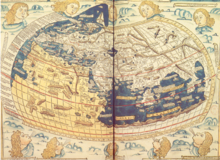Claudius Ptolemy
Claudius Ptolemy (Latin, Claudius Ptolemaeus, and Greek, Κλαύδιος Πτολεμαῖος [Klaudios Ptolemaios]; Ptolemaida Hermia, c. 100 AD. -Canopus, c. AD 170) was a Greek astronomer, astrologer, chemist, geographer, and mathematician.
Biography
Ptolemy was born in the I or II and passed away at the end of the II century. He lived and worked in Egypt (believed to be in the famous Library of Alexandria), where he excelled between the years 127 and 145. He was an astrologer and astronomer, activities that were closely linked at that time; he is also a geographer and mathematician. As a popularizer of the astronomical science of Antiquity, he dedicated himself to astronomical observation in Alexandria at the time of the emperors Hadrian and Antoninus Pius.
Scientific activity
Astronomy
He was the author of the astronomical treatise known as Almagest (in Greek, Hè Megalè Syntaxis; translated into Spanish as The Great Treatise). It was preserved, like all classical Greek treatises on science, in Arabic manuscripts, hence its name, and is only available in the Latin translation by Gerard of Cremona, made in the 17th century XII.
Heir to the conception of the universe given by Plato and Aristotle, his working method differed notably from theirs, because while Plato and Aristotle give a worldview of the universe, Ptolemy was an empiricist. His work consisted of studying the large amount of existing data on the movement of the planets in order to build a geometric model that would explain these positions in the past and be capable of predicting their future positions.
Greek science had two possibilities in its attempt to explain nature: the realistic explanation, which would consist of expressing nature on the basis of rational principles, which would take precedence over apparent facts, and the positivist explanation, which would lie in expressing the apparent, and adapting the explanatory principles to the facts. Ptolemy explicitly states that his system is not intended to discover reality, and that it is only a method of calculation. It is logical that he adopted a positivist scheme, since his geocentric theory is flagrantly opposed to Aristotelian physics: for example, the orbits of his system are eccentric, in contrast to the circular and perfect ones of Plato and Aristotle.
The Almagest contains a catalog of stars that Ptolemy took from a lost work by Hipparchus of Nicaea. Although Ptolemy claimed that he looked at the catalogue, it appears from multiple lines of evidence that the catalog was the work of Hipparchus. The Almagest also established criteria for predicting eclipses.
Geocentric universe model
His fundamental contribution was his model of the universe: he believed that the Earth was immobile and occupied the center of the universe, and that the Sun, the Moon, the planets and the stars revolved around it. Despite this, using the epicycle-deferens model, whose invention is attributed to Apollonius, he tried to geometrically solve the two great problems of planetary motion:
- The retrograde of the planets and their increased brightness while retrograde.
- The different duration of the steel revolutions.
His geocentric astronomical theories were highly successful and influenced the thinking of astronomers and mathematicians until the 16th century.
Astrology
He also applied the study of astronomy to that of astrology, for he created horoscopes. All these theories and studies are written in the work of him Tetrabiblos .
Optics
In the field of optics, he explored the properties of light, especially refraction and reflection. His work Optics is a treatise on the mathematical theory of the properties of light.
Geography
Another great work of his is Geographia, in which he describes the world of his time. He uses a system of latitude and longitude that served as an example to cartographers for many years. One of the cities described in this work is Mecca, on the Arabian peninsula, which he calls Makoraba. This work contained serious errors in terms of distances; In fact, it is thought that Columbus ended up getting to know America as a result of the fact that the Indies were noticeably closer on Ptolemy's map when sailing in that direction. In another error, this time metathesis, Ptolemy writes "katelanoi" referring to the Lacetans, one of the Iberian peoples settled in the current region of Catalonia, on the Iberian Peninsula.
Music
The world of music was not ignored by Ptolemy either. He wrote a treatise on music theory called Harmonics. He thought that mathematical laws underlay musical systems as well as celestial bodies, and that certain modes and even certain notes corresponded to specific planets, the distances between them, and their movements. The idea had been proposed by Plato in the myth of the music of the spheres, which is the unheard music produced by the revolution of the planets.
Others
He also applied his knowledge of trigonometry to the construction of astrolabes and sundials.
Works of Ptolemy
- Quadripartitum (in Latin). Venezia: Ottaviano Scoto (1.) eredi & C. 1519.
- [Opere] (in Latin). Basel: Heinrich Petri. 1541.
- In Claudii Ptolemaei Quadripartitum (in Latin). Basel: Heinrich Petri. 1559.
- Quadripartitum (in Latin). Frankfurt am Main: Johann Bringer. 1622.
- Quadripartitum (in Latin). Padova: Paolo Frambotto. 1658.
- De iudicandi facultate et animi principatu (in Latin). Paris: Sebastian Cramoisy (1.) & Sebastian Mabre-Cramoisy. 1663.
- De iudicandi facultate et animi principatu (in Latin). Den Haag: Adriaen Vlacq. 1663.
- Harmonicorum libri (in Latin). Oxford: Theatrum Sheldonianum. 1682.
Eponymy
- The lunar crater Ptolemaeus carries this name in his memory.
- The asteroid (4001) Ptolemy bears this name in his honor.
Contenido relacionado
Alfredo Di Stefano
Adeje
History of the comic in Spain

